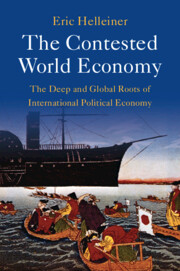Book contents
- The Contested World Economy
- The Contested World Economy
- Copyright page
- Dedication
- Contents
- Preface
- Abbreviations
- 1 Introduction and Overview
- Part I The Three Orthodoxies in a Global Context
- 2 The Rise of European Classical Economic Liberalism
- 3 Economic Liberalism from Non-European Perspectives
- 4 Neomercantilist Reactions in Europe and the United States
- 5 Neomercantilist Reactions Elsewhere
- 6 European Marxist Critiques of Global Capitalism
- 7 The Global Diffusion of Marxist Thought
- Part II Beyond the Three Orthodoxies
- Part III Ending at a Beginning
- Works Cited
- Index
4 - Neomercantilist Reactions in Europe and the United States
from Part I - The Three Orthodoxies in a Global Context
Published online by Cambridge University Press: 20 April 2023
- The Contested World Economy
- The Contested World Economy
- Copyright page
- Dedication
- Contents
- Preface
- Abbreviations
- 1 Introduction and Overview
- Part I The Three Orthodoxies in a Global Context
- 2 The Rise of European Classical Economic Liberalism
- 3 Economic Liberalism from Non-European Perspectives
- 4 Neomercantilist Reactions in Europe and the United States
- 5 Neomercantilist Reactions Elsewhere
- 6 European Marxist Critiques of Global Capitalism
- 7 The Global Diffusion of Marxist Thought
- Part II Beyond the Three Orthodoxies
- Part III Ending at a Beginning
- Works Cited
- Index
Summary
Neomercantilists rejected the liberal advocacy of free trade, urging instead strategic trade protectionism and other forms of government economic activism in order to promote state wealth and power. Their goals were similar to those of pre-Smithian mercantilist thinkers, but they defended their priorities in new ways by engaging critically with the ideas of classical economic liberals. This chapter describes the important role of Alexander Hamilton and Friedrich List in helping to pioneer neomercantilist thought as well as other less well-known thinkers from Europe and the United States who developed distinctive and influential versions of this perspective. Many of them were inspired by List but adapted his ideas in some interesting ways, including William Ashley, Mihail Manoilescu, Gustav Schmoller, and Sergei Witte. Another key figure, Henry Carey, was more inspired by Hamilton than List, but developed an important version of neomercantilist thought that was very distinctive from both of theirs. These thinkers highlight how neomercantilism in Europe and United States had more diverse content than the common textbook depiction suggests.
Keywords
- Type
- Chapter
- Information
- The Contested World EconomyThe Deep and Global Roots of International Political Economy, pp. 56 - 69Publisher: Cambridge University PressPrint publication year: 2023



